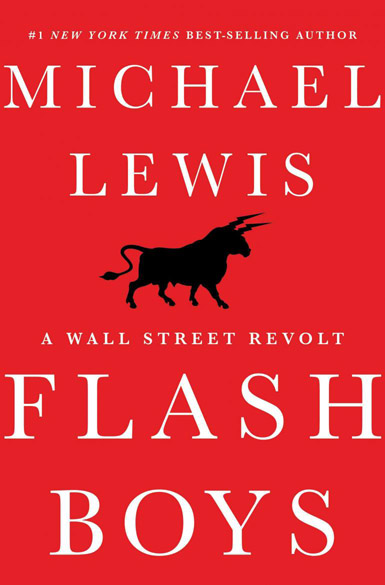Book Review - Flash Boys
April 07 2014I devoured Michael Lewis’s new book, Flash Boys: A Wall Street Revolt, when it was released recently. It meets a lot of my interests and curiosities: high-frequency trading (HFT) and Michael Lewis.

Michael Lewis can be a polarizing author. He belongs to a group of authors (including Malcolm Gladwell and, possibly, the Freakonomics guys) that write entertainingly about very complex subjects. The key is that they write about complex subjects. This causes those true experts to highly despise these authors for being too shallow*.
* My favorite example of this is Malcolm Gladwell’s assertion of the 10,000 hour rule. He essentially took an outcome from a Herb Simon research paper that was heavily based on context and extended it to other areas. It’s summarized very well here. Malcolm Gladwell drove James Schrager, my favorite Chicago Booth professor, crazy.
I don’t disagree. I think Michael Lewis is very entertaining, and I read this book as quickly as I could. I do think that he paints a very biased and one-sided view of HFT.
The book is told entirely from the viewpoint of Brad Katsuyama, a former RBC banker who started his own exchange, IEX. The latter half of the book seems to heavily promote IEX as the “right” exchange for investors. Sprinkled in, there are a few chapters on Sergey Aleynikov. Those chapters are basically word-for-word reproductions of a Vanity Fair article that Michael Lewis already wrote.
Because it’s told from Katsuyama’s viewpoint, the reader doesn’t know if Brad is simply slow (it takes him a really long time to understand what the HFT firms are doing). The book certainly seems to accuse HFT firms of illicit activity, such as front-running.
My viewpoint didn’t really change after reading this. I think it’s a borderline tragedy that some of the world’s smartest engineering minds are deployed to help these financial firms with HFT strategies. I don’t see the HFT industry as wrong or immoral, just unnecessary. The purpose of capital markets is to provide liquidity and funding for companies seeking public money. I think the capital markets would be just as efficient at doing this job without the HFT firms.
I don’t blame the HFT firms or the people who work for them. They are taking advantage of a unique market opportunity. Our financial regulation allows for this, and they are simply capitalizing on it. That doesn’t mean I have to like it. Like I said - I think it’s a tragedy. I wonder what wonderful breakthroughs we might see now if those talented minds were deployed to healthcare, technology, or agricultural industries.
comments powered by Disqus